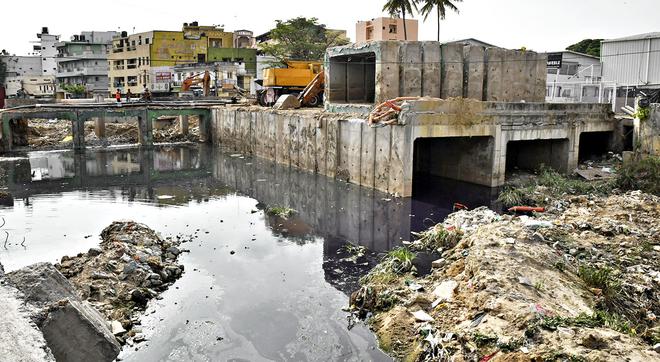In a bid to find a long-term solution to flooding in Bengaluru, Chief Minister Basavaraj Bommai on Monday announced that a master plan with an end-to-end approach would be evolved, not only to manage the existing storm-water drains and build new ones, but also link them with the Cauvery through Dakshina Pinakini.
Replying to a debate in the Legislative Assembly on the recent floods in Bengaluru owing to heavy rains, the Chief Minister said the proposed master plan would take into account the survey and study reports by Institutions, such as the IISc., on storm-water drains in Bengaluru.
Various agencies
The BBMP, the BMRDA, and the BDA would be involved in preparation of the master plan, he said, while indicating that aspects related to storm-water drains in the earlier master plan would be redrawn.
He explained that Bengaluru’s drainage system was distributed over three concentric circles. While the inner circle located at a high elevation had well-developed storm-water drains as it belonged to the core part of the city, the middle circle that comprised city municipal councils, which were added in 2006, had the problem of encroachments, and underdeveloped and narrow storm-water drains in some stretches.
The outer circle comprising 110 villages that were recently added to Bengaluru needed infrastructural upgrade as storm-water drains were yet to be built in this zone, he said.
However, there was a need to look beyond the outer circle comprising these villages by linking the storm-water drains there that carry the entire city’s water with the Cauvery if the city needs a permanent solution to flooding during heavy rains, he observed.

The Chief Minister also announced constitution of a special task force comprising experts to monitor maintenance of storm-water drains in the core areas of the city, development and widening of storm-water drains in the middle circle represented by the earlier city municipal councils and building new storm-water drains in the peripheral areas besides linking the entire drainage system with Cauvery river.
Putting a system in place would ensure continuity of policies related to storm water drains irrespective of which party is in power, he said.
Measures would be taken to prevent mixing of sewage with storm-water drains, he said, while stating that capacity of the present sewage treatment plants would be increased to recycle the sewage water in Bengaluru.
He said he would instruct officials concerned to extend the present work that is being undertaken in a few areas to prevent mixing of sewage with storm water to all areas of the city.
Karnataka High Court stay blamed
Refuting the allegations of the Opposition that the BJP dispensation had failed to continue the drive to clear encroachments of storm-water drains, he said the drive had been suspended following the Karnataka High Court’s stay issued during the pandemic period. However, the drive had been taken up again now as the court had vacated the stay, he said and asserted that there was no question of stopping the drive.
₹600 crore for Bengaluru’s rain-hit infrastructure
Chief Minister Basavaraj Bommai announced a grant of ₹600 crore as an immediate allocation for rebuilding Bengaluru’s rain-hit infrastructure. Of this, ₹300 crore would be used for rebuilding roads while another ₹300 crore would be used for developing storm water drains, he said.







